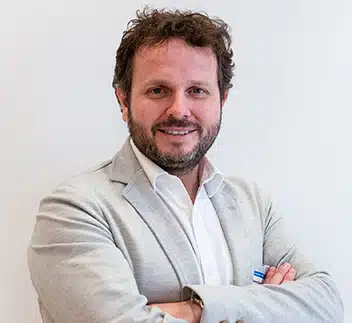SUSTAINABILITY | 09.24.2024
Javier Güemes: “The most challenging part of embracing inclusion is taking the first step.”

Dalia Alonso
According to the Director of International Relations at Grupo Social ONCE, the full inclusion of people with disabilities in employment hinges on a shift in both social and corporate mindsets.
 Javier Güemes, Director of International Relations at Grupo Social ONCE (a Spanish organization promoting the inclusion of blind and visually impaired individuals) and a member of the Board of Directors of the European Disability Forum, shared insights on employment, inclusivity, and the mindset shift needed for people with disabilities to fully thrive in their professional lives.
Javier Güemes, Director of International Relations at Grupo Social ONCE (a Spanish organization promoting the inclusion of blind and visually impaired individuals) and a member of the Board of Directors of the European Disability Forum, shared insights on employment, inclusivity, and the mindset shift needed for people with disabilities to fully thrive in their professional lives.
Your career has taken you to various leadership roles in different organizations, always with a focus on employment and functional diversity. What changes have you seen in the inclusion of people with disabilities in the workplace?
There has been progress in raising awareness of the labor rights of people with disabilities, and both the political and labor spheres have become much more sensitive to the issue. At the European level, a comprehensive legal framework on non-discrimination has been developed, and there is now a more diverse understanding of employment for people with disabilities. However, when you look at employment rates for people with disabilities, it’s clear that significant improvement is still lacking. The real challenge lies in turning this stronger legislative framework into everyday reality.
What international agreements are in place to improve accessibility to employment for people with disabilities?
The most important for us are the European directives. One key piece of legislation is the non-discrimination directive for people with disabilities, which was groundbreaking at the time as it defined various forms of discrimination and highlighted the importance of reasonable accommodation. The European Social Fund also has a focus on employment for people with disabilities, enabling organizations like Grupo Social ONCE to access funding to develop employment policies. Additionally, the general exemption for employment subsidies enables both regular businesses and special employment centers to receive state aid. A major international milestone was the adoption of Article 27 of the Convention.
How are these practices implemented and sustained within businesses over time?
The most challenging part of embracing inclusion is taking the first step. Some businesses find this difficult due to existing prejudices, such as the belief that people with disabilities are less productive and may pose challenges. However, once a person with a disability is integrated into the team, the process of consolidation and adaptation often becomes much smoother.
Once employed, what are the most common barriers faced by people with disabilities?
One challenge is the need for flexibility in the workplace; businesses must be willing to adapt to diverse needs. Another concern is the lack of professional support within the organization: individuals with disabilities are often overlooked for internal promotion opportunities after being hired. There are also issues related to reasonable accommodation and job retention when a disability develops, which is quite common, and businesses may not always be equipped to handle these situations.
How do automation and artificial intelligence contribute to labor inclusion?
Technology is already a fundamental part of work, globally enhancing the ability of people with disabilities to participate. For example, screen readers have empowered blind and visually impaired individuals to perform remarkably in their jobs. What’s the risk? We need to ensure that technological advancements include accessibility criteria. Without these criteria, they can create significant barriers, leading to an employment gap. Now, the rapid pace of development also leaves little time to seek solutions; accessibility must be integrated from the outset.
What is the biggest challenge facing Grupo Social ONCE in improving employment accessibility?
The key issue is raising awareness and ensuring that accessibility is a mandatory criterion in all areas, including employment. We want businesses and public administrations to integrate accessibility for people with disabilities automatically into their criteria. Our goal is for businesses to understand the benefits of inclusion: by prioritizing inclusivity, they can better meet market needs and become more competitive.
What role does volunteering play in the organization’s activities? Why is it important?
Volunteering is essential. At the national level, it offers personal support that is key to the daily assistance of people with disabilities. Internationally, we seek volunteers who focus not only on individuals but also on structural support to promote the integration of people with disabilities. For instance, retired teachers may visit schools to assist children with disabilities.
How can we, as a society, ensure that we “leave no one behind” in the professional realm?
I believe a significant mental shift is necessary: any person with a disability can perform any role, whether professional or not, on equal terms with others. With that understanding, it becomes easier to consider what actions you can take to help that person thrive in their professional role equally.
RELATED ARTICLES:



